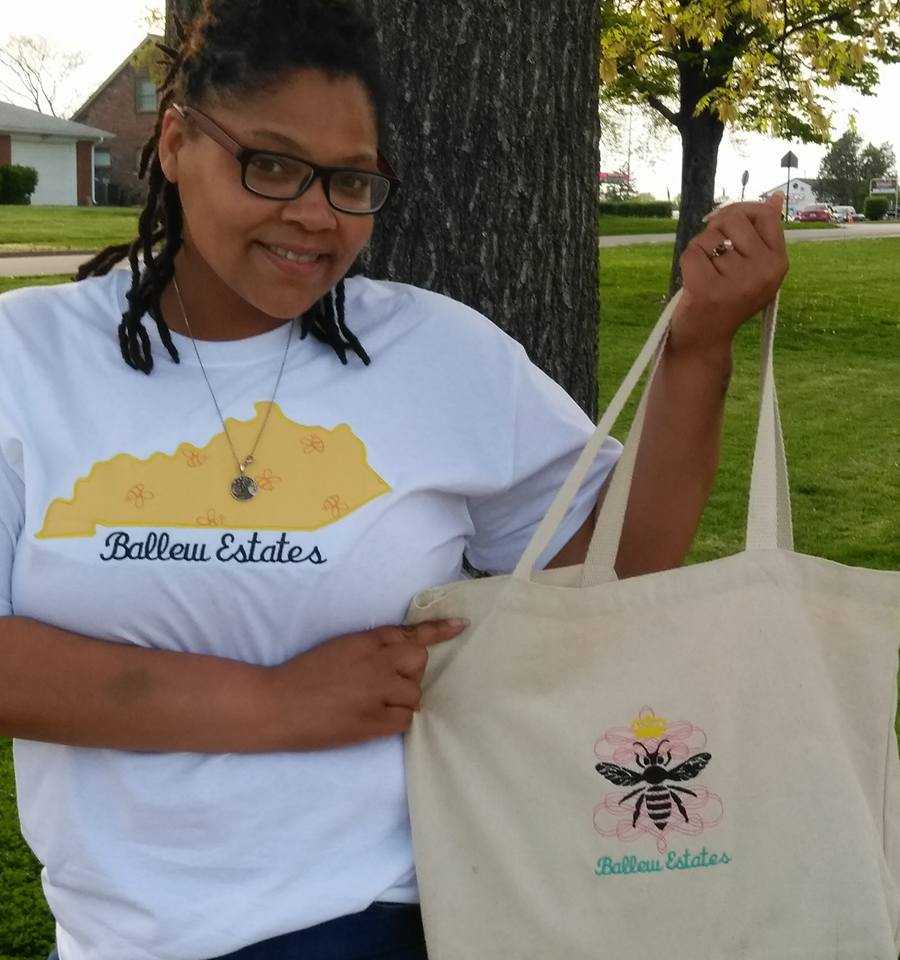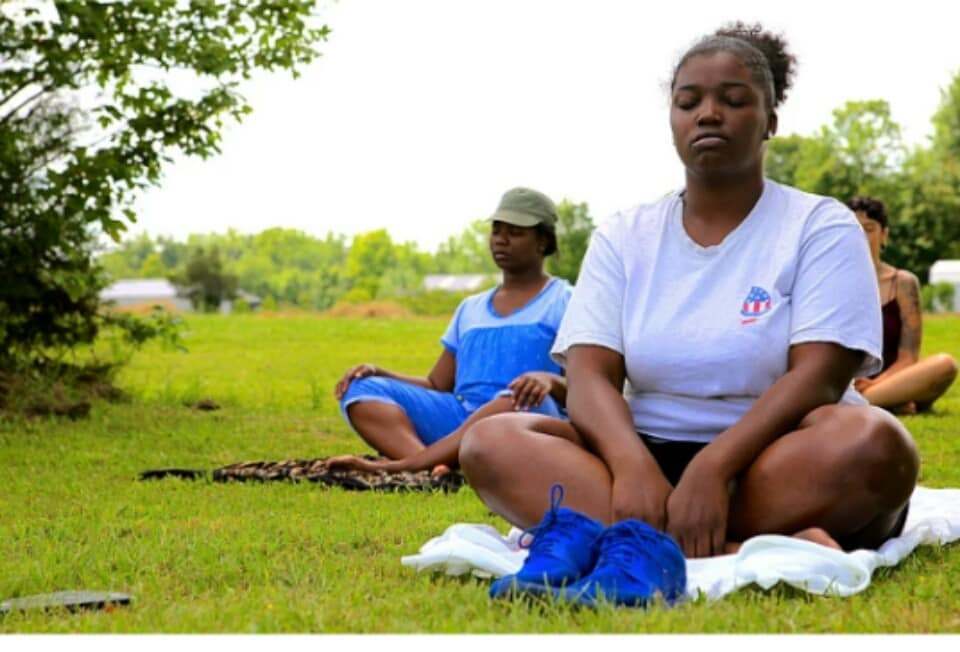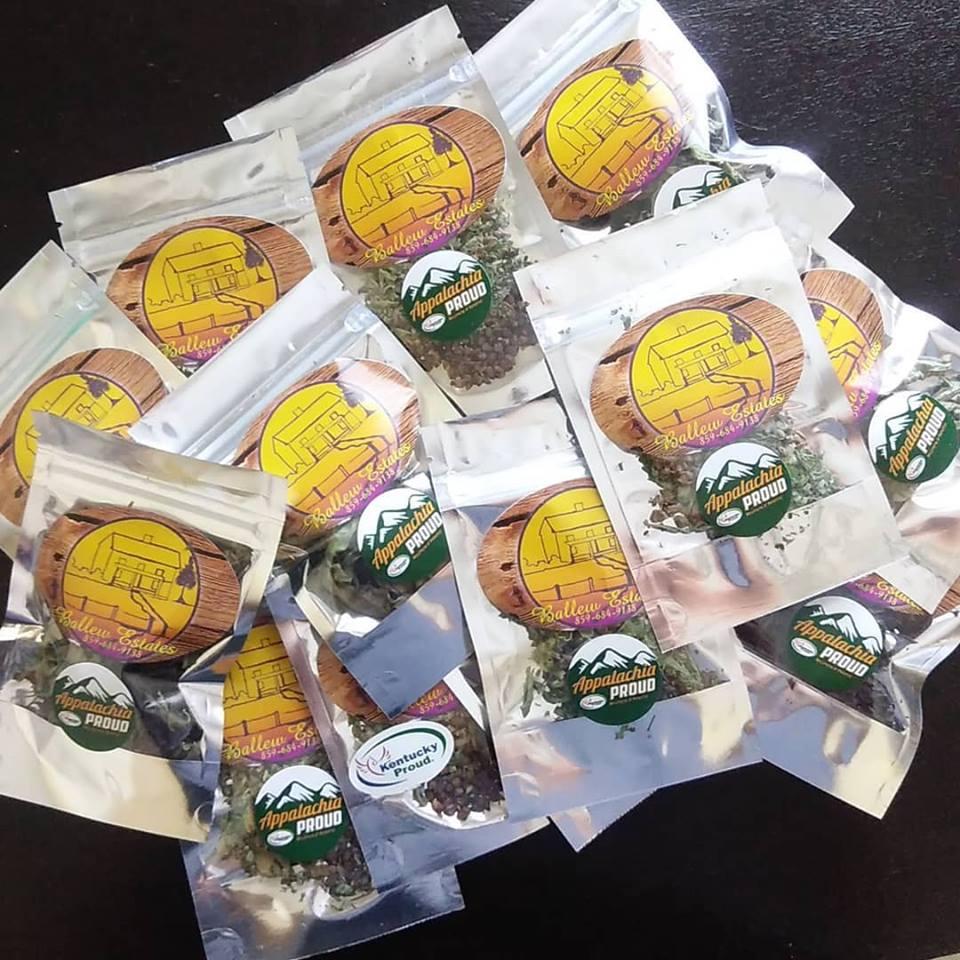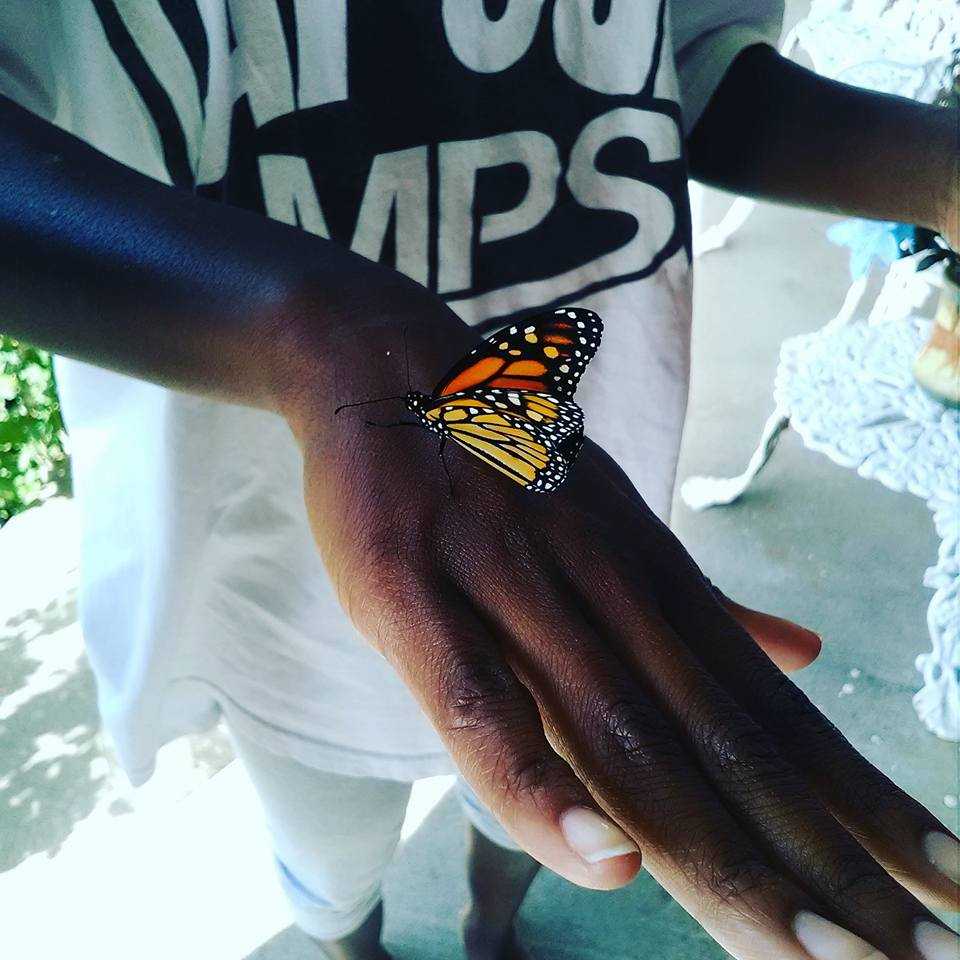"The Struggle in Rural Kentucky, Being a Black Producer, Is Real"
May 10, 2019

New Dream speaks with Tiffany Bellfield, a third-generation resident of the Appalachian town of Richmond, Kentucky, and part owner of Ballew Estates, a 26-acre family farm and pollinator conservation. Tiffany discusses the challenges she's faced as a business woman of color, and her contributions to her community as a holistic farmer, producer of botanical products, wellness practitioner, convener of women’s retreats, and mom.
Tell us a bit about who you are, what you do, and what brings you to this conversation?
I've been doing volunteer and grant funding work in my community for a while now, and I used to be a medical professional at a large hospital. I start with that because so many of the stories that need to be told—including my own—center around unfair spaces, people needing resources, food inaccessibility, and the medical crisis in the black community.
I realized I could continue to make an impact if I began educating people about clean eating and sustainable ways to grow food and eat. When my grandmother passed, I was fortunate to become part-owner of the land I grew up on as a child, Ballew Estates. My cousin and I began making it into a space for kids and adults to come and reconnect to the land. We provide education and events for the community, including women's retreats and pollinator workshops for kids. We also sell packaged herbs and four blends of herbal teas.
I received my certification in holistic remedies, which, along with the estate, inspired me to add more layers to the education I wanted to curate: how we are connected to each other and the land, and how to grow herbs, edible flowers, and other fruits. I’ve used the history and stories of my elders to teach this type of education, and to include how race and equity have weighed in on land and resource loss, and bad eating habits. The history goes so deep.
As I started building my business, it was hard to find resources. The struggle in rural Kentucky, being a black producer, is real. I couldn't win. I began working with Community Farm Alliance, where I serve as Farm to Table Coordinator, and built relationships that have helped. But the fear of losing the land and the lack of respect I got from “the good ol’ boy system” was and is still real.
More people are interested in my story than my product. It's almost like they say “wow, you made it.”
Can you tell us a little more about your family’s story of land, and the challenges you faced in starting Ballew Estates?
Before my grandmother passed, we found out there was money against the house owed to a big lender, and other expenses still left to pay from before my grandfather had passed. These had all accumulated on land that has been in my family for generations, and we've lived in the area for a lot longer – since slavery (which we shouldn’t have even had to deal with). But we had to do everything we could.
So we got the property, and then my mom was trying to pay back the loan. They wouldn’t change the loan to our names, and of course our credit scores didn’t meet the requirements for the arrangements that the lender had with my grandfather. And so we started to pay it back slowly, and then my mother got scammed. We tried to report it to the higher authorities, but there was nothing they could do. The lender didn’t care about our circumstances, and they tried to foreclose on us. The loan wasn’t even that large of an amount initially, it just became so bad with interest over time.
"During this process, nobody ever gave us any resources, nobody ever told us what to do, nobody was trying to help us. We were trying to talk to all these people, and nothing was happening."
During this process, nobody ever gave us any resources, nobody ever told us what to do, nobody was trying to help us. We were trying to talk to all these people, and nothing was happening. It got to the point where we ended up having to take a second mortgage out under my mom, which was able to cover the bulk of what we had to pay, which was by this point four times the amount we actually owed. But that’s what we had to do.
We had to drive all the way to Cincinnati, where the lender’s lawyers were, and we had 15 minutes before they were going to close on our estate—literally. It was so intense, it was crazy. My cousin was here in Richmond at the time, waiting for the fax to come in, to show that we paid it, for the lawyers to say we were ok. It was crazy.
All this is show that this isn’t the case of someone just getting a house and running into some trouble with money. This is historical property that we’re on. There’s even a cemetery in our background from the 1700s I think. And it’s registered down there, where we are.

Is this type of challenge common in your area or your community?
“Eminent domain” has become very real in this part of the United States, in parts of Kentucky. I’ve literally watched people I know lose their land—it’s not a game.
There’s been a couple of times even recently where we’ve communicated with the lender—while we’ve been trying to make payments, where my mom is getting paperwork (because they never send anything to the house, which is a whole other story), with all these loopholes they create—where we’ve been scared to death that we’re gonna lose our house. It’s been so crazy, to the point that if I had the money to do it, I would have sued the county of Madison and our lender—but I don’t have that pool.
These days, I host events and such on my property, to show community members how we live and where I came from. It's amazing how this changes people’s perception from what is widely shown to society. Black farmers DO exist, in small numbers. But to many people, they can't believe there even are blacks (farmers or not) in Appalachian Kentucky.
What are the issues most deeply impacting you and your community right now? What does this look like? How is equity relevant and important to these issues? Or, how do you and those in your community experience inequity?
Equity to me is equal opportunity—for everyone. Real change. If this work was truly equitable and fair, it wouldn't be this way. My job with Community Farm Alliance opened my eyes to agricultural inequities. My grandfather was a tobacco farmer, who had his own struggles but was also financially blessed. For us, starting at the bottom, it's all about who you know, not what you know. Seeing the same white faces on every panel in every organization that makes decisions about our livelihood speaks volumes.
Resources are just easier for a white man to get. In Madison County, no matter what we had, no matter what documentation we provided, there was always pushback. Myself and my cousin, who stewards the land and lives nearby, we KNOW what we are talking about, but they still give us the runaround. Then I started working for Community Farm Alliance, and when I’m talking there, it’s not the same. It’s my job to make sure that the beginning poor farmer, that minority farmer, that part-time farmer, does not miss the ticket because they aren’t already in the loop.
I’m a Ballew—we have been agricultural advocates for a long time. We’ve always had to fight for our land and been fearful of losing it, and hardly anybody has the resources to keep it. I’ve physically watched black farmers struggle around me, and it’s simply because it’s who you know. Now, I have been lucky enough to network with good people, and to build relationships in an organization that I know cares and with people who I know are good.
Can you tell us a little more about your interest in holistic health education?
I knew I wanted to farm out here, but it’s really the education aspect, which my family has been deep-rooted in, that I want to focus on—making sure kids know their roots, keeping kids as kids, letting them learn about land. I have a 13-year-old daughter that I homeschool right now, and amidst my crazy life, I have always made sure that she was in STEM education, that she is always outside, that when my grandparents were able to do things that she was active with us, that she’s working on the land, and everything. I was raised in tobacco farming, so I tell her all those stories, and then when other kids come here, I tell them those stories too.
When we decided to start Ballew Estates, and to make the land into a conservation space, we also wanted to do a pollinator education program. The Earth and all of us die without the pollinators, right? By teaching people about pollinators and the land, I realized that not only could I educate from a STEM point of view, but I could educate from a medical point of view—about how we can holistically heal.
"By teaching people about pollinators and the land, I realized that not only could I educate from a STEM point of view, but I could educate from a medical point of view—about how we can holistically heal."
When I was a medical tech, I did a bit of everything. And I learned that so many people could be healthy and not fall into bad situations if we 1) nipped bad habits in the bud when they were kids, and 2) did a lot of preventative care, in clean and easy ways. It’s so important—these simple things about how to take care of yourself in a healthy way. I am living proof of that: I used to be 325 pounds, very toxic, and now I’m the healthy chick. And I tell people, this is what I did. But I always bring it back to the land. I want people to see where I’m at, and where I come from. Even after being in the city and ruining my health, I came back here, and this is what I was able to learn from it—and others can too.
I’ve recently started to grow more flowers than herbs, and I run women’s retreats out here—and they’re awesome. I had recently gone through a bout of domestic violence that left me unable to walk for a few months, and during that time, I met so many people through volunteering who were dealing with similar issues to mine, ALL of them—grievances, family issues, land loss, health—a complete web of issues. I wanted to help people not only deal with them, but deal with them holistically.
At the time, I was also building a network of entrepreneurs who were all holistic healers in different forms and capacities: yoga, reiki, massage, public speaking / motivation, metaphysical healing. So I wanted to get all these people together and help people with their healing. And everyone can just come out here and enjoy themselves! And it’s only been growing.
As part of the holistic side to this, I began to make teas for people based on need. Of course, this was for my family first! It really took off this year, and now I'm selling to consistent clients and also working to sell to restaurants and stores.

Can you talk more about some of the equity and race-related challenges that you’ve faced as a business owner?
A major issue in my community is that there are no black businesses here. There’s a patriarchal system in Kentucky—we all know this. Living my whole life here in Richmond, I have haven't seen black people in power here since I was younger. Most businesses are white-owned, which I know is the same in most other places in Kentucky, and the south in general. When I go into one of these businesses, they look at me like, “what are you even doing?” If we could only communicate better, I think that’s so important.
This dynamic is one of those things that’s been happening forever, but it’s been sugar-coated so that people don’t really have to believe it’s real. When we are in rooms talking about farmers and community development, and there are only white people—and mainly just white men—then there is an issue. Every time I’m in a space like this, I am the only black person, aside from some family members that I work with.
I think in Richmond, Kentucky there is just this unspoken understanding of racism between white folks and people of color—and I really hate that. And I think that’s why a lot of people don’t come back.
To be honest, I admit that I need to learn more about that, and to be in those rooms more often. But what I DO know is that, today, when you’re walking down the street in Richmond, or you’re driving through, there are no black hair stores, no black beauty parlors, no black foods—and there used to be all of that. There WAS power, there WAS money, there WERE black enterprises, and for some reason, perhaps the disconnect in generations, they have passed, and it makes me so sad.
What do you feel that you and others in your community can do to help address some of these inequities?
If we do not teach the generations below us—preparing them for leadership and guiding them ahead of time—then when the elders have left, we lose power. I remember my grandfather tried to teach me so many things, and of course at that time there was no easy way to record things. Which makes it even more important to preserve this kind of knowledge for the next generations—about what we did wrong and how they can do it better.
I also feel that in order to reach the voices of people who are not normally heard or seen, then blacks, Latinos, women, and people of color need to be represented on our boards. We also need to meet these communities where they are at, to go to their neighborhoods, directly to them, to tell them about issues and things—otherwise it doesn’t happen.
"In order to reach the voices of people who are not normally heard or seen, then blacks, Latinos, women, and people of color need to be represented on our boards. We also need to meet these communities where they are at, to go to their neighborhoods, directly to them, to tell them about issues and things—otherwise it doesn’t happen."
Very often policymakers tell us that we should take more initiative to do the work of finding information on our own, navigating websites and offices, gathering communities, and putting on events and board meetings and spreading knowledge, when really that isn’t our job. They’re coming into OUR community, and telling us what THEY need for us to be doing. They should be telling US when the next meeting is gonna be, at my front door.
It’s common, here in a small town, that people in power hang out in the same spaces and networks. The judge, the attorney, the statesmen, and the school principal are all in the same social circles. So information that everyone should know and have access to, is just casual conversation between them, and they get ahead in the game.
These are people in power, who are in a position to make change, but who couldn’t care less about going out of their way to create equitable situations for people and communities who don’t look like them. It’s because it’s easier to do this, and because they don’t have to look in the mirror and confront why it’s been like this for people like my community, for so long.
And then there are also people who look like me, who are uncomfortable and unhappy with the way things are but don’t want to speak out against it. It’s because they’re scared of the pushback and resistance they would receive, and what could potentially happen to them and their families if they fight back. It’s hard.

What gives you hope? What does the new dream, the changed future, look like?
The biggest thing that I’m working on right now is the plant and pollination education program for kids and young people. The fact that the kids are so receptive to it, the fact that we have family matriarchs come through our estate, the fact that I get to teach kids about bees and how our ecosystem works and why we need them, and then for their parents to get involved. These things inspire me and give me hope.
Planting seeds in my community with black kids, Latino kids, poor white kids, helps me feel like I’m building little conservationists—people who are more aware of nature and what is around them—and contributing our piece to our link in the larger ecosystem.
Also, letting them see me—a woman of color, a black woman, a single mom in her thirties, a woman who has changed her life in a year, even in the midst of me feeling like a low-class citizen—was really dope. Showing people this made it even more important—showing them that we are healing each other and doing amazing stuff at the same time.
Making a safe place when I’m in the community, and making my home a safe place and inviting people to come here, teaching them ownership, this is all so important to me. Every time somebody leaves here, I want them to leave with something that they can continue to do. I have my daughter, nieces and sisters, and my mom all watching me, too, I want to make them proud. And that keeps me going.
What is something you think is important for people to know about these issues and your story? Why do you want them to hear it?
I think there are a lot of assumptions about this stuff. I want people not to assume that we don’t want your help. And don’t assume that we know everything that is going on behind the scenes— because we have been shunned, taken for granted, disregarded, and had our land and our ideas stolen. People need to understand what this kind of post-traumatic stress does to people of color, and to poor people. Please learn about and understand what we’ve been through.
And—we do want your help! We are all people. We all need to communicate better so we can address our misunderstandings.

